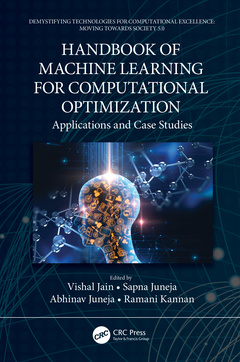Description
Handbook of Machine Learning for Computational Optimization
Applications and Case Studies
Demystifying Technologies for Computational Excellence Series
Coordinators: Jain Vishal, Juneja Sapna, Juneja Abhinav, Kannan Ramani
Language: English
Subjects for Handbook of Machine Learning for Computational Optimization:
Keywords
Data Set; Quantum Machine Learning; Random Forest; Cyber Security and Intrusion Detection; SVM; Fault Detection and Prevention; Health Informatics; Quality Assessment; Elm Classifier; Facial Recognition; Single Layer Feed Forward Neural Network; Computer Vision; KNN Classification; DEA Model; EMG Signal; Arm CPU; Smite; Feature Subset; Student Dataset; Raspberry Pi; Imbalanced Data; Sentiment Score; Received Code Word; Random Forest Classifier; DEA; PSO Algorithm; CNN Architecture; Hidden Neurons; CDF; Message Word; Mango Wood
· 15.6x23.4 cm · Hardback
Description
/li>Contents
/li>Readership
/li>Biography
/li>
Technology is moving at an exponential pace in this era of computational intelligence. Machine learning has emerged as one of the most promising tools used to challenge and think beyond current limitations. This handbook will provide readers with a leading edge to improving their products and processes through optimal and smarter machine learning techniques.
This handbook focuses on new machine learning developments that can lead to newly developed applications. It uses a predictive and futuristic approach, which makes machine learning a promising tool for processes and sustainable solutions. It also promotes newer algorithms that are more efficient and reliable for new dimensions in discovering other applications, and then goes on to discuss the potential in making better use of machines in order to ensure optimal prediction, execution, and decision-making.
Individuals looking for machine learning-based knowledge will find interest in this handbook. The readership ranges from undergraduate students of engineering and allied courses to researchers, professionals, and application designers.
Chapter 1 Random Variables in Machine Learning Chapter 2 Analysis of EMG Signals using Extreme Learning Machine with Nature Inspired Feature Selection Techniques Chapter 3 Detection of Breast Cancer by Using Various Machine Learning and Deep Learning Algorithms Chapter 4 Assessing the Radial Efficiency Performance of Bus Transport Sector Using Data Envelopment Analysis Chapter 5 Weight-Based Codes—A Binary Error Control Coding Scheme—A Machine Learning Approach Chapter 6 Massive Data Classification of Brain Tumors Using DNN: Opportunity in Medical Healthcare 4.0 through Sensors Chapter 7 Deep Learning Approach for Traffic Sign Recognition on Embedded Systems Chapter 8 Lung Cancer Risk Stratification Using ML and AI on Sensor- Based IoT: An Increasing Technological Trend for Health of Humanity Chapter 9 Statistical Feedback Evaluation System Chapter 10 Emission of Herbal Woods to Deal with Pollution and Diseases: Pandemic-Based Threats Chapter 11 Artificial Neural Networks: A Comprehensive Review Chapter 12 A Case Study on Machine Learning to Predict the Students’ Result in Higher Education Chapter 13 Data Analytic Approach for Assessment Status of Awareness of Tuberculosis in Nigeria Chapter 14 Active Learning from an Imbalanced Dataset: A Study Conducted on the Depression, Anxiety, and Stress Dataset Chapter 15 Classification of the Magnetic Resonance Imaging of the Brain Tumor Using the Residual Neural Network Framework
Vishal Jain is an Associate Professor in Deptt. of CSE at Sharda University, Greater Noida, India. He has earlier worked with Bharati Vidyapeeth’s Institute of Computer Applications and Management (BVICAM), New Delhi, India (affiliated with Guru Gobind Singh Indraprastha University, and accredited by the All India Council for Technical Education). He first joined BVICAM as Assistant Professor. Before that, he has worked for several years at the Guru Presmsukh Memorial College of Engineering, Delhi, India. He has more than 350 research citation indices with Google scholar (h-index score 9 and i-10 index 9). He has authored more than 70 research papers in reputed conferences and journals including Web of Science and Scopus. He has authored and edited more than 10 books with various reputed publishers including Springer, Apple Academic Press, Scrivener, Emerald and IGI-Global. His research areas include information retrieval, semantic web, ontology engineering, data mining, adhoc networks, and sensor networks. He has recipient a Young Active Member Award for the year 2012–13 from the Computer Society of India, Best Faculty Award for the year 2017 and Best Researcher Award for the year 2019 from BVICAM, New Delhi.
Sapna Juneja is Professor in IMS, Ghaziabad, India. Earlier she has worked as Professor in Deptt. of CSE at IITM Group of Institutions and BMIET, Sonepat. She has more than 16 years of teaching experience. She completed her doctorate and masters in Computer Science and Engineering from M.D.University, Rohtak in 2018 and 2010 respectively. Her broad area of research is Software Reliability of Embedded System. Her areas of interest include Software Engineering, Computer Networks, Operating System, Database Management Systems, and Artificial Intelligence etc. She has guided several research thesis of UG and PG students in Computer Science and Engineering. She is editing book on recent technological developments.
Abhinav Juneja is
These books may interest you

Handbook of Mixture Analysis 71.13 €

Handbook of Mixture Analysis 196.56 €


